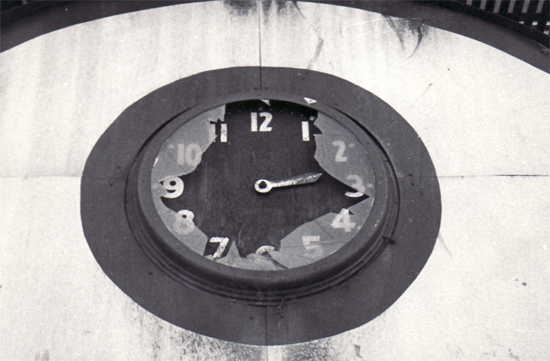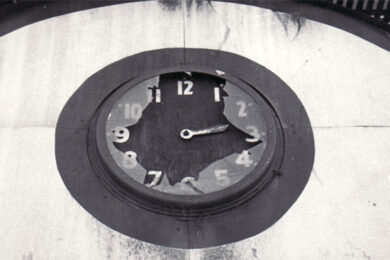Within fifteen minutes of BBC Radio 4’s Today show signing off last Wednesday morning, seven out of the first ten status updates on my Facebook account were links to the story of Radiohead’s latest digital release, ‘Harry Patch’. Within a further fifteen minutes I had played and bought the song. Half an hour earlier I’d not even known it existed. The rush of excitement amongst my friends propelled me to the site and made me part with money almost gratefully.
Eighteen months ago – as a goody-goody-two-shoes member of the so-called music industry who had, after watching musician friends see their income rapidly diminish, largely restrained himself from illegally downloading anything other than out-of-print material – I read details of of Portishead’s forthcoming album. The release date was confirmed as April 28th, but that was still over ten weeks away. Only three days later, however, The Observer had deemed it "stunning". By mid March the music world was ablaze with excitement at Third‘s torturous genesis and its radical departure from the Portishead template, but the general public still had six weeks to wait before they could hear it.
Except they didn’t. A DJ friend came by to visit me, brandishing an iPod containing six tracks he’d downloaded from blogs. The whole album’s out there, he told me. I typed "Portishead blogspot" into Google and, despite my guilt, two minutes later Third was mine. It had been leaked on March 7, only three weeks after its release was announced.
You know that sensation when you’ve spent ten minutes leafing through a menu choosing which of the delectable items is worth your cash, only to be told by a disdainful waiter that, sorry, it’s not actually available? That’s the feeling I get every time I read about a new record and then discover I can’t buy it for months. It’s no wonder people turn to the internet to get our music. Like me, many folk would be more than happy to cough up the necessaries to purchase a record if they could buy it when they first learn of it. But they can’t. So in an age when we can have pretty much what we want as soon as we want it – TV on demand, flights booked in minutes, GPS offering us directions as we drive – why should we wait weeks to buy allegedly life-changing albums?
The answer is simple: because stores demand coverage of a record before they agree to stock it. They want pre-release stories to drive people into their shops arguing that, without this, they risk wasting shelf space and, therefore, reduced profits. Labels consequently remain beholden to monthly print media whose long lead times insist that it receive records up to three months in advance in order to decide what coverage to offer. But the inevitable wait between announcement and release, accompanied by the growing hype, drives fans and curious alike to the web, and there they can almost certainly find what they want thanks to the illicit leaking of the music about which the media and marketing campaigns have started to tease them.
Ironically the very record labels that threaten to sue file sharers are indirectly responsible for most of the leaks. To whip potential buyers into a frenzy they make vast quantities of advance CDs available to media, often encouraging websites to upload tracks as part of ‘viral’ marketing campaigns. This increasingly desperate desire to see tastemakers champion releases has led to sites satisfying the frustration labels carelessly provoke in consumers by making whole albums available, justifying this as the product of their enthusiasm, normally adding the proviso that we should buy the music we like as soon as we can. But the subtext is simple: why should anyone wait two months in this day and age to hear music that’s ready to go?
The solution to this fiasco is so facile it’s embarrassing. It won’t stop illegal downloading altogether, obviously, but then again nothing will. Record labels need to reduce their ‘release cycle’, the period of time between delivery of an album and its legitimate availability. It’s not like they’ll be taken by surprise: most bands don’t just wake up one day and decide an album is finished. They communicate its imminent completion to those who need to know, people who in turn plan its promotion. Labels just need to adapt to a swifter way of thinking.
But the music industry is resistant to change: labels say that a lack of pre-release awareness would mean that no one finds out about a release until after it’s out, and they wouldn’t be able to persuade shops to stock it so it would therefore disappear. Artists as big as Radiohead can manage this, they complain, because their profile is already global, but new artists can’t take the risk. Retail meanwhile complains that it would be forced to take chances on music that hasn’t been tried and tested through the media so they therefore run the risk of losing money in an already desperate market place. And print media complains that it would only be able to write about releases retrospectively, unattractive since they obsess about exclusive scoops and regurgitated press releases rather than opinions.
None of these arguments hold much weight, however. In this digital age labels can swiftly release music via legitimate download platforms and allow people to discover it, immediately or over time, without the associated costs of manufacturing, shipping and warehousing large amounts of CDs that often end up scrapped. Encouraging people to spend money on a product is nothing new: it might be easier for Radiohead to spread the word, but this was always a new band’s first priority, and every business has its risks. Allowing people to buy music as they discover it is surely to everyone’s benefit, so one wonders if the real fear is simply that the public will discover the real weakness at the heart of the industry: poor A&R. There was, after all, a time when labels recognised that long-term development was actually in their interests, in sharp contrast to their current willingness to drop the ball if an artist doesn’t connect within a month of release. They presented acts that they nurtured instead of moving swiftly onto the next Raygun wannabes with whom they too soon lost patience after spunking even more cash and again devaluing their own product.
Retail must also simultaneously accept that the digital market is not their enemy and can actually help drive people into stores over time, much as a marketing and media blitz always did. As a recent New York Times piece illustrated, the vast majority of people still purchasing music do so on physical formats, so careful monitoring – or perhaps even communication from the labels and distributors themselves, God forbid – will enable them to pick up on releases that are ‘hot’ just as fast as music fans themselves. Any labels fearful that they’ll lose out on sales if their CDs are not stocked only need to prove to retail that it’s in their interest to rack a record and besides, it’s not like there aren’t online stores people can order from if the high street lets them down. The desire that record companies have to remain in cahoots with bricks and mortar retail is built upon antiquated values, and while high street stores may complain that new systems could cut them out of the market, it’s probably worth mentioning that the invention of the combustion engine didn’t result in the death of all horses.
Of course such a change requires a significant cultural shift within the industry, but that’s got to be easier, and considerably less arrogant, than expecting the world’s cultural habits to change on the industry’s behalf. Such a shift, however, is presumably why nothing will change: The Man still seems to believe there’s a way of stopping all illegal downloading rather than trying to lure us back into paying for at least some of what we consume. He won’t accept a solution that offers only a partial restoration of the income he claims he’s losing since he wants it all.
Labels have to accept that the old systems don’t work. This lack of sentimentality may lose them the only friends they have left – retail and media – but these despise most of them anyway. The longer labels refuse to acknowledge that the immediate satisfaction of an urge to hear music can persuade people to part with hard earned cash, the longer they will suffer. The longer they hold on to redundant business models the less chance they have of rescuing their business with new ones. And the longer they stall, the more people will lose patience with them and source their music illegitimately instead. Radiohead proved with In Rainbows that people enjoy instant gratification, and have done so again with ‘Harry Patch’. That might be morally troubling but it’s always been human nature. In the past we hurried down to the local record shop in the week of release because we couldn’t get our music any earlier. But now we can, if only due to the industry’s incompetence. So don’t blame us for that. And don’t expect us to keep waiting.



